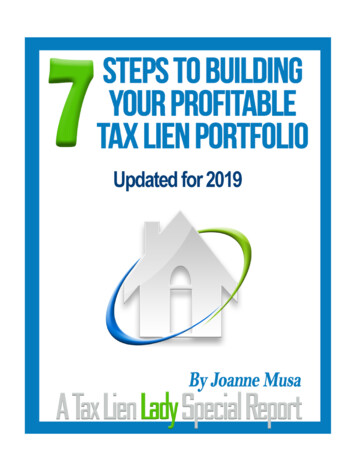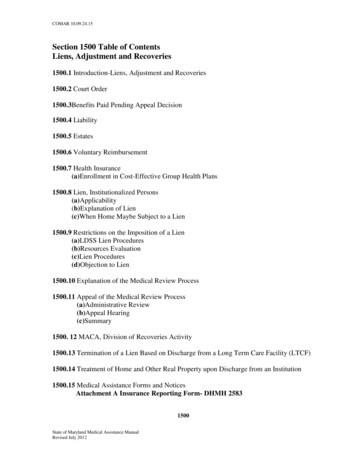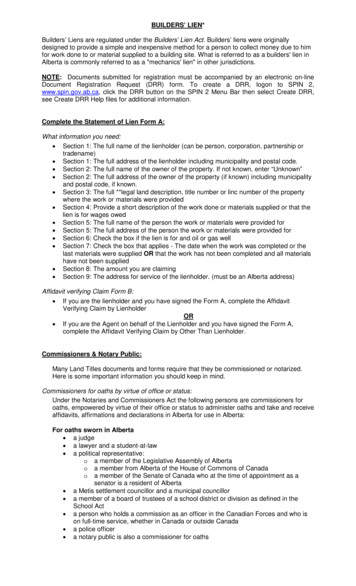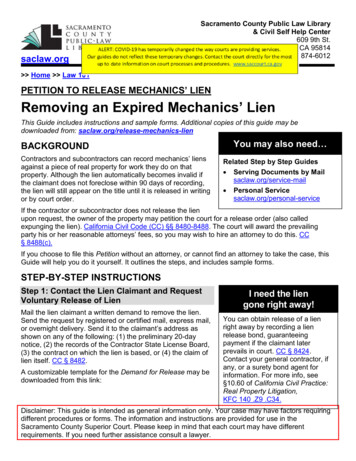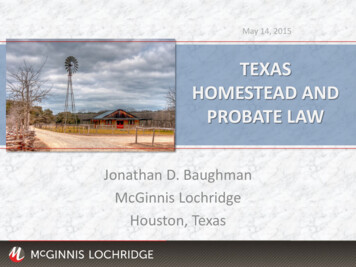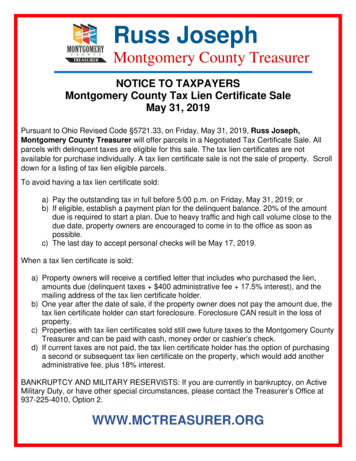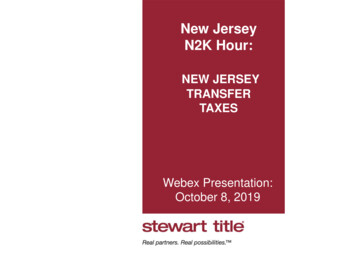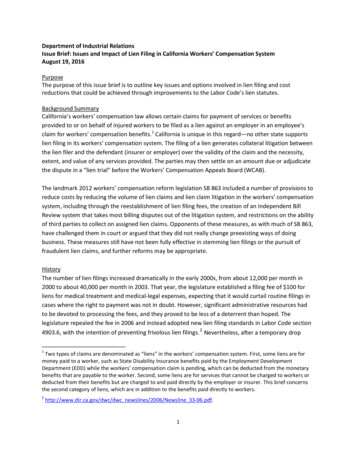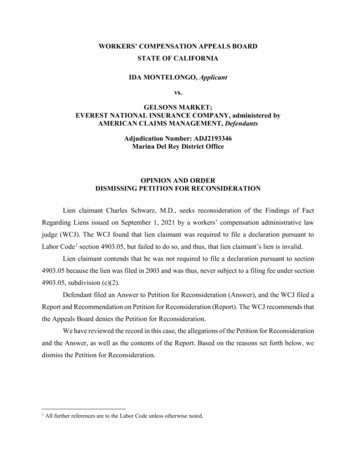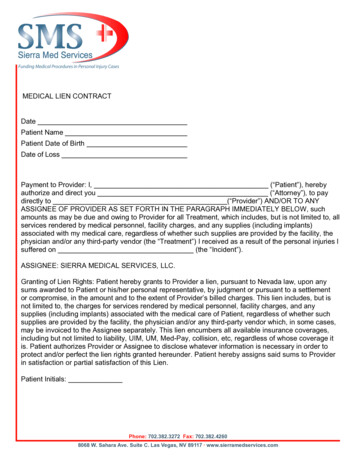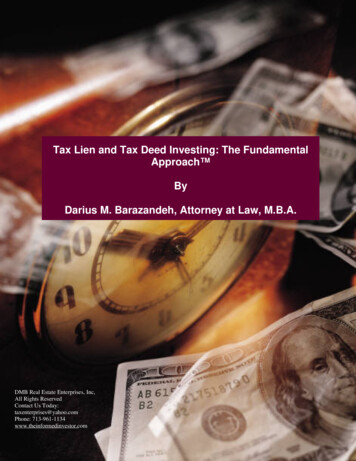
Transcription
Tax Lien and Tax Deed Investing: The FundamentalApproach ByDarius M. Barazandeh, Attorney at Law, M.B.A.DMB Real Estate Enterprises, Inc,All Rights ReservedContact Us Today:taxenterprises@yahoo.comPhone: 713-961-1134www.theinformedinvestor.com
Disclaimer‘This publication is intended to provide accurate and authoritative information with regard tothe subject matter covered. It is offered with the understanding that neither the publisher northe author is engaged in rendering legal, tax or other professional services. If legal, tax orother expert assistance is required, the services of a competent professional should besought.’-From a Declaration of Principles jointly adopted by a committee of theAmerican Bar Association and a committee of Publishers andAssociations‘This Material is Not a Substitute for Legal Advice and its purchase or use does not create anattorney/client relationship’- Disclaimer Required by Texas StatutesThe author and publisher make no representations with respect to the contents of thispublication and disclaim any implied or express warranties of merchantability or fitness forany particular usage, application or purpose.While this information has been carefully edited and updated to accurately reflect the law, taxrules, local and state guidelines, this is a field that can change quickly. Statutory provisionsand legal rules are constantly being changed, revised, and/or interpreted. Readers must usecaution before utilizing the information and practices contained within this publication. Thisinformation is not a substitute for expert advice and careful diligence. It is for instructionalpurposes only.This publication is covered under the protection provided by the copyright laws ofthe United States (title 17, U.S. Code). It is illegal for anyone to violate any of therights and protection provided by copyright law. Any unauthorized reproduction ofthis publication or its sections (in whole or in part) will be considered a directviolation of copyright protection and shall be punished to the fullest extent underthe law.
Tax Lien and Tax Deed Investing: The Fundamental ApproachAbout the AuthorDarius M. Barazandeh is a licensed attorney in the state of Texas and has a Master'sDegree in Finance. He is the author of two acclaimed home study systems Texas Housesfor Pennies II: Unlock the Secrets and Attorney’s Secrets to Investing in Tax LienCertificates. He is also the author of numerous articles on real estate, tax foreclosure rules,and legislative updates.Mr. Barazandeh has experience with many forms of real estate investing including leaseoption transactions, note creation through mobile home ‘flipping’ (i.e., quick buying andselling) and residential single family construction projects. As an attorney he has assistedclients with business and real estate transactions. In his home state of Texas he is themember of several State Bar divisions, such as The Real Estate, Probate, and Trust LawDivision of the Texas Bar Association and the Business Law Division of the Texas BarAssociation.In addition to his legal and real estate experience, Mr. Barazandeh has proven himself in thechallenging world of business consulting. Mr. Barazandeh’s business and financial expertisehas served numerous companies and governmental clients. As a business consultant withthe prestigious firm of Deloitte & Touche, LLP he worked in many complex businessscenarios and helped to maximize the cost effectiveness and profitability of over 30 largescale organizations.Some of his clients have included the Harris County Tax Assessor Collector, the City ofHouston Municipal Court System, the Port of Houston Authority and the Austin IndependentSchool District where worked with the Texas Comptroller of Public Accounts to identify,report, and revise ineffective processes and procedures for cost savings totaling over 10million dollars. [1]To learn about Mr. Barazandeh, his services and/or top-rated home study systems pleasecall 713-961-1134.[1] Savings to the Austin Independent School District totaled: 10,196,189. Source: TSPR SchoolPerformance Review, Austin Independent School District; Release Date: April of 2000.THIS MATERIAL IS NOT FOR RESALE. IF YOU ASKED TO PURCHASETHIS INFORMATION PLEASE CALL: 713-961-1134 2007 DMB Real Estate Enterprises, Inc, All Rights ReservedPhone: 713-961-1134Email: taxenterprises@yahoo.comPlease Visit Us Online at: www.theinformedinvestor.com3 of 20Copyright 2007www.theinformedinvestor.com
Table of ContentsDisclaimer . .2About the Author . 3I. Preface . 5II. Introduction . .7III. Tax Liens vs. Tax Deeds: A Differing Approach .77Tax Lien Processes IV. The Tax Lien Process: How Does This Work?.89.Here’s What I Learned . . 10What Effect Can Proper Investment in Tax Certificates Have?. 10Foreclosure and Large Profits . 11Is This For Me?. 11V. Rights and Advantages for the Tax Lien Holder . 121) A High Priority Lien Holder Position . . 122) No Landowner Liability or Maintenance Responsibility . . 123) Enforcement Rights Without Enforcement Duties . 124) The Right to Purchase Later Year Tax Liens . 13After Sale Opportunities . 13VI. Investor Preferences . . 13Property Ownership Strategies . 14Redemption Strategies .14VII. Conclusion . . . .14VIII. Learn More About Tax Lien Investing .16IX. Learn More About Texas Tax Deed Investing . .17
Tax Lien and Tax Deed Investing: The Fundamental ApproachProfile: Stock market losses result in postponement of or a returnback to work from retirement for older Americans; NPR Weekend Edition Sunday (NPR); JOE PALCAMany Americans in their 50s and 60s are having to re-evaluate theirfuture lives as they've seen their stock-driven retirement programsshrink dramatically.I. PrefaceLikemillions of Americans you areprobably wondering how you can attainthe highest and safest return on yoursavings in the shortest period of time. Thegoal of any investment should be tomaximize appreciation while minimizingrisk. While the stock market can give youstable long-term appreciation potential ifyou diversify and hold for a number ofyears, one market downturn and years ofgains can be wiped out overnight.Unfortunately, most Americans will leavetheir money in the stock market with thehope that they will accumulate enoughwealth to retire before another marketdownturn occurs. These worries do notend once retirement begins however,since the same investors will have theadded burden of frantically watching andtrying to ‘predict’ the market to make suretheir nest egg stays intact.In my work as a financial consultant and inmy study of Finance, I formed the opinionthat that the greatest obstacle to attainingwealth through the stock market is theefficient market hypothesis (‘EMH’).This controversial theory is usually onlydiscussed in academic circles but it affectseach of us everyday. EMH states that it isimpossible to beat the market becausestock prices already incorporate and5 of 20Copyright 2007reflect all relevant and known information.Proponents of this theory state that it ispointless to search for undervalued stocksor try to predict trends in the marketbecause the market (i.e., buyers) hasalready taken into account risk and growthfactors, economic trends, and futureincome when stocks are traded.While I don’tcompletelyagree withEMH theoryit doesremind usthat there aremany forcesaffecting thestock marketwhich arecompletelybeyond ourcontrol.According to aRecent AARP Study:Impact of Stock MarketDecline on 50 – 70 YearOld Investors: 77 Percentof respondents betweenthe ages of 50 to 70 whoown stock lost money ininvestment accountsbetween the years 2000and 2002.67 percent of respondentshave adjusted their lifestyledue to losses. (1)Thismisunderstandingofmarketprinciples has left millions and millions ofinvestors with the incorrect notion thatthey can ‘beat the market’ thereby findinga route to financial freedom. This is a verywww.theinformedinvestor.com
Tax Lien and Tax Deed Investing: The Fundamental ApproachStock Slide Alters Tacoma, Washington-Area Investors' RetirementPlans; The News Tribune (Tacoma, Washington) (via Tribune Business News)Jul. 31--Shouting above the grinding noise in Tacoma's Atlas Foundrycore room, Dan Hanson, 61, figures he's lost more than half his401(k) savings in the stock market.Kathleen Dabbs, 58, already had retired and was ready for the goodlife. But her financial portfolio took a hit, and she's back in thework force, selling gift items.difficult task and practically impossible inthe short-term (i.e., 10 to 15 years).Sadly, even those who manage to makegood returns stand to lose much of itduring a market downturn. Years of gainscan be lost in months, weeks, or evenovernight. The results can be devastating.My background in corporate finance andreal estate law has enabled me torecognize critical alternatives to thenauseating stock market ride we all hate.I began to look for investments whichprovided more security to the investor.Traditional real estate investing was anattractive possibility, until the frustration ofproperty management left me wary ofbuying too many properties. The moreproperty I had under my control, the moreheadaches I encountered. Even worse,when I factored in maintenance, property6 of 20Copyright 2007taxes, vacancies, and income taxes theresults did not justify the means. I wasburned out with tenants, vacancies,collecting rent, and the endless inventoryof ‘We Buy Houses’ signs I had to posteverywhere.One day while working as a businessconsultant at one of the largest taxcollection entities in the United States, Ilearned that there is a state-mandatedprocess which allows for a stated nonfluctuating return on your investment. Themethod is called tax lien investing and ifwell researched, it will allow you tobecome the owner of property for a merefraction of market value or earn between16% to even 50% per year. In otherwords, you will either earn a high rate ofreturn on your invested funds or you willown the property at a deep discount.www.theinformedinvestor.com
Tax Lien and Tax Deed Investing: The Fundamental ApproachII. IntroductionAs a real estate investor and former financial consultant, I know that earning 16% to 50%interest through a low risk and low maintenance investment is rare to say the least. I haveinvested using many different creative real estate transactions such as lease options, ownercarried notes, ‘flipping’ (i.e., quick sales), etc. and while some investments in real estate canmatch such high rates of return, very few can equal the safe and passive cash flow potentialof property tax liens. In the following sections you will learn more about these benefits.Contrasting Rights: The fundamental differencebetween a stock market investor and the a tax lien investorare the legal rights given to each:Tax Lien Purchasers: Are secured creditors and hold apowerful position in the law. As secured creditors they can‘foreclose’ on their position and obtain legal title to theattached assets.Common and Preferred Stockholders: Are fractionalizedowners of a company, but do not have a right to foreclose.They are not creditors and do not have ‘real’ security intheir investment. In fact, common stock holders could bedescribed as ‘speculators’ with little right or remedy if theirshare value decreases. In fact, during bankruptcybondholders are paid first, then secured creditors, thenpreferred stock holders and last common stock holders.The first benefit that I will review isderived from the fact that the propertytax lien is secured to real property asa first priority claim. This gives you avery powerful guarantee, assumingyour research is correct. You areguaranteed either: 1) a favorablereturn on the money invested or 2)deeded rights to property. Guaranteeis a strong word, but I have seen thisprocess thousands of times and if youperform proper research you will earnasubstantialreturnonyourinvestment. Of course if you don’tfollow proper research steps, then asin any endeavor you will likely fail.The thing that I like best about tax lien investing is that it can be done with small or largeamounts of money. Tax liens can be purchased for nominal amounts of money (e.g., under 200) or at larger sums (e.g. 30,000 or more). This is a perfect investment for those whoare afraid to risk a lot of money and who just want to get their feet wet. If you are still unsureabout some of the technical aspects of investing, don’t worry. I will detail the specifics foryou in the sections that follow.III. Tax Liens vs. Tax Deeds: A Differing ApproachAlmost every state and territory, in the United States, has a process that is used to collectdelinquent property taxes and place reliable taxpayers back on the tax role. This processoccurs at the last juncture of the tax collection process and it allows ordinary individuals topurchase the rights of local governments in tax delinquent property. The process can beseparated between two general types of systems: ‘tax lien systems’ and ‘tax deed systems’.The tax lien and tax deed processes may be distinguished by the ‘bundle of rights’ sold tothe purchaser. In states using a tax deed system, if the taxes are not paid, countygovernments will sell full ownership and possession rights to the investor. Currently 177 of 20Copyright 2007www.theinformedinvestor.com
Tax Lien and Tax Deed Investing: The Fundamental Approachstates authorize the sale of ownership rights to tax delinquent property through a tax deedsale or assignment deed. Conversely, in so-called ‘tax lien’ states county governments sellonly their right to the tax lien or tax claim on the real property. A total of 18 states haveauthorized sales of the counties’ tax lien position to the public. NOTE: The remainder of thistext will cover the tax lien investment process.Tax Lien ProcessesRecall that in a tax lien state, counties do not sell property; rather they sell their lien forunpaid property taxes. This lien is an encumbrance or enforcement right held by the county.As discussed earlier, the lien does not grant full ownership rights to the property, but it doesprovide the investor with two commanding rights:1) The right to receive interest penalty charges if the lien is paid off by the delinquentproperty owner, and2) The right to foreclose the tax lien and take title to the property if the lien is notpaid.Even better the property tax lien is a high prioritylien superior to judgment liens, mortgage liens, trustafforded a high priority positiondeeds, and other private liens. Since the tax lien isamong other state and local liens.a high priority lien, if you do foreclose and take titlethen you will have a relatively clean title. Any liensForeclosure: Is the powerful legalthat still exist on the property will be from a veryright that allows the tax lien holder to taxtitle to the real estate backing thesmall class of liens that are easy to discover prior tocertificate. The foreclosure of a lienyour purchase. These costs are usually factoredgenerally erases all subordinate or lesserinto your investment costs. Moreover, since theliens. This is a powerful enforcementproperty tax lien is usually for a small fraction of thefeature of property tax liens.properties’ market value the investment is highlysecured. In addition, the lien purchase does not subject the investor to land owner liabilitysince no right to possess or occupy the property is granted by the sale of the lien.Property Tax Liens: Are generallyIV. The Tax Lien Process: How Does This Work?At this point you may wonder how liens make to the sale process. This section will provideyou an overview of the processes leading up to the sale. Basically, if an owner of realproperty does not pay their property taxes the department of revenue or other appropriatetax collection entity will file a lawsuit to collect the unpaid taxes, and if such taxes are notpaid, the rights to the tax lien itself will be sold at a public tax auction.8 of 20Copyright 2007www.theinformedinvestor.com
Tax Lien and Tax Deed Investing: The Fundamental ApproachThe taxation statutes and general laws of almost all states mandate a tax sale foreclosureprocess that allows common citizens, just like us, to purchase tax sale properties. Selling taxlien certificates allows local governments to collect the lost revenue from unpaid propertytaxes.Here's how it works:At a public auction a tax lien certificate will be sold with an opening bid made up of theamount of back taxes owed. This amount will usually be comprised of: Delinquent Property TaxesInterest ChargesPenalty FeesLegal CostsAdministrative Charges and FeesWhen a tax lien certificate or a tax deed is sold, the purchaser acquires the ‘bundle of rights’once held by the county or taxing unit. Tax sales may be held annually, semi-annually,quarterly, or monthly. There are no restrictions for bidding at these sales (i.e., you do nothave to be a real estate agent, attorney, professional investor, etc.); however you usuallymust be able to pay the bid amount within a short period of time.For a specified period of time the delinquenttaxpayer has the right to buy back oropportunity found with tax lien certificates. To"redeem" the property. This is called the ‘rightactually ‘redeem’ the property the delinquentof redemption’. In many cases thisproperty owner will be required to pay back theredemption period may be as short as 6costs of the certificate plus the interest ratemonths or as long as 4 years. If the delinquentstated on the certificate.owner does not redeem the property duringthe specified redemption time period, then the successful bidder is entitled to the propertyregardless of the purchase price. Let me say that again:Redemption: creates the interest bearingthe successful bidder would be the owner of the property even if it was bought for 5,000 and it has a market value of 150,000!That sounds great, but what happens if the delinquent owner decides to exercise their rightof redemption? Does the investor lose all of the money invested at the auction? No, not atall! In that case they (the delinquent property owner) must pay the investor an interestpenalty charge on top of what was originally paid at the tax sale auction. This interest chargecan range from 16% to 50% (for redemptions occurring during the first year) or up to 50%.What this means is that you will get back the money originally invested plus the interestpenalty charge. This amount can equal a significant rate of return for the investor.9 of 20Copyright 2007www.theinformedinvestor.com
Tax Lien and Tax Deed Investing: The Fundamental ApproachHere’s What I Learned: There is a way toForeclosure and Profits: I recentlyearn a guaranteed 16% to 50% per year onreceived a phone call from a student whoyour investment dollars if you use properforeclosed on a 150 acre tract of land worthtechniques. You can purchase high yield 140,000. The best news is that the studentinvestments designed to protect thepaid only 15,000. Foreclosure was used toenforce the lien when the ‘redemption’ interestinvestor, but you have to know which onescosts were not paid. State law gives theto stay away from. You will either obtaininvestor the right to foreclose as anrights to tax foreclosed or tax encumberedenforcement remedy.property or earn a high rate of return onyour money if you follow the right steps inthe right order. One thing that I have found separates successful from non-successfulinvestors is professional help. Professional assistance is fundamental because, as with anybusiness venture, there are rules and guidelines that must be understood and followed. Thissentiment was repeated in a recent article in The Philadelphia Tribune:Tax lien investments can increase your bank account; PhiladelphiaTribune, The; 1/12/1999Philadelphia Tribune, The01-12-1999 - Tax lien investments can increase your bank accountBeverly Hills, Calif. -- With professional expertise and a littlemoney down, in less than three years you could own several hundredthousand, to several million dollars worth of property, free andclear.What Effect Can Proper Investment in Tax Certificates Have?Quite simply the effects are astounding. For example, let’sAlbert Einstein, when askedtake a hypothetical investor, Investor A. Investor A placeswhat he considered the most 3,000 in a retirement plan at age 30 with an average ratepowerful force in theuniverse, repliedof return of 7% per year for the next 20 years. This"Compounding interest".investor’s money would double about once every 10 years.At the end of the investment term and at age 50 theinvestment would equal approximately 11,609.05. In reality, since most banks today areonly paying 1.5% to 2.8% per year, Investor A would have only 5,000 at age 50. Evenworse, income taxes will greatly reduce the compounding effect. As a result, Investor A willbarely keep her money ahead of inflation!10 of 20Copyright 2007www.theinformedinvestor.com
Tax Lien and Tax Deed Investing: The Fundamental ApproachGrowth of Funds in 20 YearsNow let’s take Investor B, who simply usesa strategy of investing in tax lien 120,000.00certificates with an average annual return 100,000.00of 20%. At age 30 Investor B starts with 80,000.00 3,000. Investor’s B’s money woulddouble about once every 3.5 years. As a 60,000.00result by age 50 the initial 3,000 would 40,000.00have grown to over 115,000. If that 20,000.00investment was continued for just another 10 years that initial 3,000 would now haveInvestor AInvestor Bgrown to well over 700,000! Investor Balso uses a self-directed IRA to administer each tax lien and tax deed purchase. Investor B’sfunds will grow tax free, thereby allowing a small investment to easily grow into a milliondollar portfolio.NOTE: One scenario missing from this hypothetical is the effect to your return on investmentif the property backing the certificate becomes yours. A single tax lien certificate could yieldyou a profit of 50,000, 60,000, or more if you sell the property backing the lien. Reinvesting this amount would exponentially increase your returns!Foreclosure and Large ProfitsPerhaps the most powerful right of the tax lien holder is the right to begin foreclosureproceedings. Foreclosure proceedings should begin if the cost of the tax lien plus interest isnot paid off within the redemption period. Interestingly, since tax liens generally amount toless then 10% of a properties’ market value, foreclosure creates a tremendous profit windfallfor the tax lien investor. For example: with proper research, an investor foreclosing on 5,000 worth of tax liens can acquire a property valued 55,000 or more. Thus, a loan-tovalue ratio of 10% is possible and seemingly unequaled ( 5,000 foreclosure costs / 55,000 10%). Many traditional and creative forms of real estate investing can only createloan-to-value ratios of 70% or more.Is This For Me?As you can see investing in tax lien certificatesThe Laws of Compounding andallows safe use of the laws of compounding tothe Rights of the Lien Holder:increase wealth. A well researched strategy willCombine to create a powerful opportunityfor the tax lien investor. Quite simplyallow you to safely bypass the ‘yo-yo’ effect of stockthese results are ‘unequaled’ in the lawmarket investment, since each tax lien certificateor in traditional ‘market’ investments.has an incorporated ‘safety net’. This safety net isquite literally the real estate which backs thecertificate. Best of all with proper research techniques there is no reason that the real estatewill not be worth much, much more than the face value of the certificate itself. So you either11 of 20Copyright 2007www.theinformedinvestor.com
Tax Lien and Tax Deed Investing: The Fundamental Approachget the stated rate of return set by state law or you obtain the property. That is a true safetynet. Contrast this to stock market investment: Do companies on the New York StockExchange provide a safety net like local governments provide? Obviously, they do not. Inaddition, the incorporated ‘safety net’ discussed above there are several additional benefitswhich will be discussed in the next section.V. Rights and Advantages for the Tax Lien HolderA properly researched tax lien will award the investor with numerous benefits and in mostcases very few headaches. In addition to the right of redemption and the right to foreclose(discussed earlier in this text), there are several other key benefits for you if you choose thisinvestment technique:1) The Property Tax Lien is a Priority LienThe Most Important Aspect ofPosition: At the tax sale the investorTax Lien Investing: Arises from thepurchases a tax lien once held by thehigh priority position of the tax lien. Othercounty.The priority position of thetypes of liens do not create the sameproperty tax lien is not subordinated (orpositive benefits for investors. Almostdiminished) because a private party nowevery month I hear from someone who hasholds the lien. The investor holds theinvested in a Home Owners Associationsame rights once held by the county. Thislien. They ask me ‘What are my rights?’helps you because the foreclosure of yourSadly, they have few rights since theyfirst position tax lien will clear almost allpurchased a low priority lien. Properinformation is criticalother liens from the title. Foreclosure notonly places full property ownership in thehands of the investor, but it purges the land title of other subordinate liens and debts.The end result is a property interest that is generally ‘free and clear’ of otherobligations on the title. NOTE: Exceptions do exist to this rule but a well-developedresearch strategy will enable the investor to avoid other liens surviving foreclosure.2) No Landowner Liability or Maintenance Responsibility: An often forgottenbenefit of tax lien investing is the passive nature of the investment. Only one state inthe U.S. grants the tax lien purchaser with possession of the property. In all otherstates, the investor does not obtain possession by purchasing the tax lien. Theinvestor is simply a super priority lien holder, but not a property owner. This is ahuge benefit to the investor because there is no landowner liability. This is clearly anadvantage as lawsuits against property owners/operators continue to rise. Accordingto the Wall Street Journal (Feb 2003):"Something as simple as paying a college kid to clean yourgutters or giving youngsters a few bucks to shovel thedriveway could lead to a serious lawsuit."12 of 20Copyright 2007www.theinformedinvestor.com
Tax Lien and Tax Deed Investing: The Fundamental ApproachThe lack of control over the property creates an asset protection feature for the taxlien investor. NOTE: After foreclosure the tax lien investor will have possession ofthe property.3) Enforcement Rights Without Enforcement Duties: Another advantage is that thetax lien investor need not demand payment or start collection efforts to compelpayment from the delinquent property owner. Although the lien is now owned by aprivate investor the county will still handle enforcement of the lien until foreclosure.Some states will actually handle the foreclosure process for you. Irregardless, thereis no contact with the delinquent taxpayer. Moreover, in the redemption scenariomost state tax offices handle the collection of redemption money plus interest. Thismeans that you don’t have to handle messy collections when you purchase tax liens.4) The Right to Purchase Later Year Tax Liens: Liens sold at auction are only forone year’s delinquent taxes. If the property owner defaults on next year’s taxes thenthe investor has the right to privately acquire these taxes with no competition. It alsoreduces research time since the investor will already be familiar with a particularparcel.Clearly tax lien investing presents some very favorable advantages to the astute investor.The numerous purchase opportunities and the high security/low risk nature of tax liens makethis an extremely attractive option to many active forms of real estate, stock and bond marketinvestment.After Sale Opportunities: The tax lien purchaser is also favored by the surplus of tax lieninstruments that are available for purchase. For example, at the 2003 Maricopa County,Arizona tax sale 21,200 liens were available for sale but only 14,156 liens were sold. A totalof 7,044 or approximately 33% of liens were made available for purchase after the tax sale.In 2004, that percentage totaled 27% and was stillIn Almost Every Tax Lienwithin the historical range of fluctuation. AlthoughJurisdiction after saleArizona’s Maricopa County is a very popular destinationopportunities are available. I like tofor tax lien investors, literally thousands of liens are stillsuggest different guidelines whenavailable for purchase after each sale. Such liens wouldinvestigating these liens. First, makesure the value of the lien is no morestill carry a full 16% interest rate for the investor. Whilethan10% the value of the property,such a large inventory can create confusion for thesecond be sure to view the property.investor, a systematic process for eliminating liens canMore detail is found in my systemstransform this into a simple yet profitable exercise.but its important to recognize thatspecific techniques and bench marksapply to certain situations13 of 20Copyright 2007www.theinformedinvestor.com
Tax Lien and Tax Deed Investing: The Fundamenta
Tax Lien and Tax Deed Investing: The Fundamental Approach . A. bout the . A. uthor . Darius M. Barazandeh is a licensed attorney in the state of Texas and has a Master's Degree in Finance. He is the author of two acclaimed home study systems Texas Houses for Pennies II: Unlock the Secrets and Attorney's Secrets to Investing in Tax Lien .
